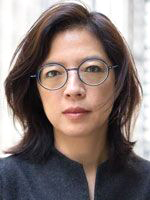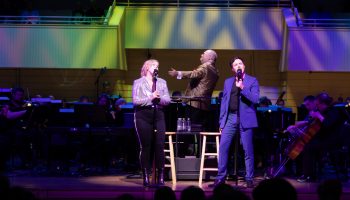
From book club discussions to visual arts exhibitions to orchestra performances, literature, art and music all have their place at Chautauqua — and today, classical piano and poetry will collide at a recital given by J.Y. Song, guest member of the School of Music piano faculty.
Song will perform in concert with Sofia Bunting Newman, a conservatory actor for Chautauqua Theater Company, at 4 p.m. Tuesday, July 16 in Elizabeth S. Lenna Hall. Song will play three compositions by Claude Debussy — “Images, L. 87,” “Etudes, L. 136,” and “Epigraphes antiques, L. 131” — and one piece by Heitor Villa-Lobos: “Rudepoêma, W. 184.”
Song will play the piano, and Newman will read accompanying poetry. Song was inspired to put together a program in this format because of Week Five’s theme, “The Life of the Spoken Word.” Though Song will not be at the Institution during that week, the idea of combining music and poems inspired her.
“It’s all just very colorful music,” Song said. “Debussy was known for using color in new ways, and in that way I think he was very inventive in his use of sound … and Villa-Lobos as well — there are sounds in ‘Rudepoêma’ that I think were probably unprecedented.”
The first Debussy suite, “Images,” consists of three short pieces: “Lent – mélancolique et doux” (Slow — melancholic and sweet), “Souvenir du Louvre” (Remembrance of the Louvre) and “Quelques aspects de ‘Nous n’irons plus au bois’ parce qu’il fait un temps insupportable’ ” (A few aspects of “We won’t go to the woods” because the weather is dreadful). These pieces are not often played and are sometimes called “the forgotten ‘Images,’ ” as they were published after Debussy’s death.
“(It’s) sort of an immediately beautiful work, very characteristic of his style, very fluid; there are moments that seem timeless,” Song said.
The third piece within this set is based on a French nursery rhyme, with a lively and tongue-in-cheek tone, according to Song.
“He puts a few phrases here and there throughout the music, which is quite unusual for him,” Song said. “It’s a very charming set.”
The second suite, “Etudes,” is also made of three smaller pieces, which Song chose from the original 12 pieces in the full suite: “Pour les arpèges composés” (For compound arpeggios), “Pour les octaves” (For the octaves) and “Pour les huit doigts” (For eight fingers). The first is characteristic of Debussy’s colorful, liquid style. The second is happy in tone and “technically challenging,” Song said. The third is an unusual piece that requires the pianist not to use their thumbs, limiting them to eight fingers.
“I don’t know that there’s any other piece in the (piano) repertoire that does this,” Song said.
The third suite, “Epigraphes antiques,” is made up of six shorter pieces based on poems by Pierre Louÿs, a French poet and friend of Debussy’s. Louÿs claimed to have translated these poems from text found on the walls of a tomb in Cyprus that belonged to an Ancient Greek woman Bilitis, a contemporary of Sappho. Though this claim was later debunked, the poems retain an ancient quality to them, and caused some scandal when first published due to their erotic, lesbian themes and content.
“(Debussy) wrote music that seems to sound very ancient,” Song said. “It seems to refer to another time and place … based on memories, or this feeling of things being in the distant past.”
Newman will recite the original poems in between Song playing each piece. In this way, they will blend spoken word and classical music. The six movements are “Pour invoquer Pan, dieu du vent d’été” (For Pan, god of the summer wind), “Pour un tombeau sans nom” (For an unnamed shrine), “Pour que la nuit soit propice” (For a good night), “Pour la danseuse aux crotales” (For the dancer with rattlesnakes), “Pour l’Egyptienne” (For the Egyptian) and “Pour remercier la pluie au matin” (To thank the rain in the morning).
“I think the words are, themselves, very beautiful, and they blend very well with the music of Debussy,” Song said. “There’s something very free about his music; it doesn’t seem tight and rhythmic, so it’s almost like speech. … There’s a seamlessness to moving to the music and the text and back and forth.”
The final piece, by Villa-Lobos, is a musical portrait of Arthur Rubinstein, a pianist with whom Villa-Lobos was close friends. It is a departure from the other pieces, but Song chose it for its contrast. It also fits the theme of spoken word because the title, “Rudepoêma” translates to “Savage Poem.”
“I think there’s something really quite special about this piece, in that Villa-Lobos said that it’s meant to be this intimate portrait of his friend,” Song said. “And so it’s a very personal work in that way.”




